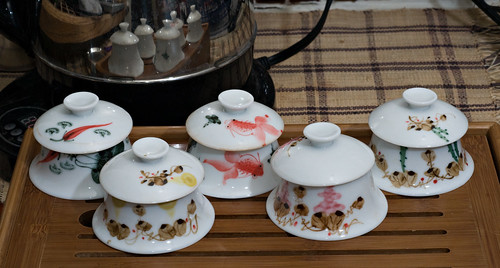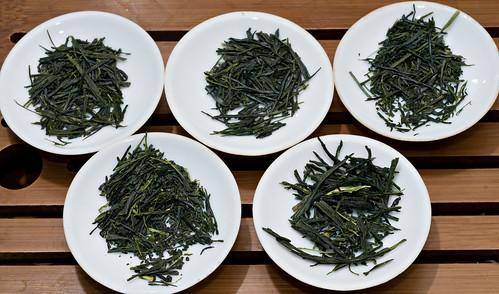!!! My website has
moved: please update your bookmarks to debunix.net !!!
Just for fun, I am doing this first round of the Asamushi OTTI 7
tasting blind, not having looked up which teas correspond to which
number. Thanks for the minimalist labeling on this one, Chip! I also
stopped reading the OTTI topic when people started reporting their
impressions, so I could review them after forming an opinion of these
teas. So…I couldn't stand to wait, and tried 'em all at once.
1-1.1 grams of tea in my smallest gaiwans

Asamushi Sencha Tasting by debunix, on Flickr
1 oz/30 mL of tap water
temp held at 160 degrees from the Pino, although variable as much as 5
degrees around that from pour to pour
leaves all very similar except #5, with much longer larger bits of leaf
that are also darker

Asamushi Sencha Tasting by debunix, on Flickr
first infusion about 30 seconds: all had pale yellow green liquors
1 sweet, vegetal
2 nutty, sweet
3 sweet, nutty
4 sweet, nutty
5 grassy sweet
second infusion about 15 seconds
again, I am having lot of trouble telling the difference between the
first four. The last one is very distinctly grassy, herbaceous, and
less nutty. The others are vegetal/nutty/sweet, remind me a bit of
edamame, and so similar in flavor profile, despite trying them in
different orders, I can't find much consistent difference in them.
third infusion, 30 seconds, very similar sense of the first four teas:
sweet, nutty, vegetal, delicious; but the fifth is very strongly
reminiscent of the korean greens I've tried, with that very strong
grassy taste, but it is a lovely sweet grassiness, nothing whatsoever
bitter about it.
Upping the temp for forth infusion, to 170 degrees and time to 50
seconds
Again, same results: all are sweet, lovely, vegetal, but the fifth
sings out with that grassy wonderfulness.
Really, I'd be happy with any of these for my morning sencha; the
difference of number five is not better, just nice for variety.
Going to try a fifth for about a minute. The sweetness is decreasing,
there is a bit of herbaceous bitterness that is coming out in these
later infusions, but still no significant difference in the depth or
quality of flavor in the first four teas. The fifth tea is still quite
different, grassy and lovely in a very different way.
The wet leaves show similar differences: the first four are a paler
shade of green, more broken than the more intact, deeper green leaves
of the fifth tea.

Asamushi Sencha Tasting by debunix, on Flickr
I think I'm sencha'd up for the morning, and quite contented. Yum. Now
off to the topic to unblind….and ah….that's why number five is so
different. It's kabuse….is that the same as kabusecha?
The Shin-ryoku from Den's is one I've had before and really enjoyed, so
the others that are so similar are a very pleasing find. Next up,
reading back through the topic to check out what everyone else thinks
of them, and individual tastings to see if I can bring out more
differences between the first four; doing them this way, all I could
taste was their similarities.
Return
to Tea Tastings
Return
to Diane's Tea Page
Return
to Diane's Food Page
Return to Diane's Home Page


